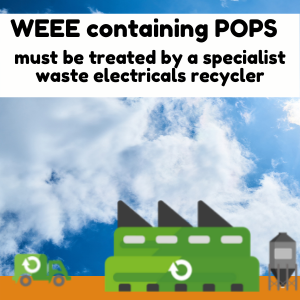
The plastic in most waste electricals, apart from streetlighting, contain hazardous flame retardants. That means it is an offence to try to recycle them as scrap metal. They must be sent to a specialist waste electricals recycler. The flame retardants in question are regarded as Persistent organic pollutants or POPs. Plastic which contains POPs must be separated out, and then destroyed. This only happens if the equipment is put through treatment companies with access to the specialist separation technologies.
POPs, WEEE, and hazardous waste
An investigation conducted by the Industry Council for Electronic Equipment Recycling (ICER), with Defra and the UK’s environment agencies, led to the conclusion that most WEEE must be classed as hazardous, unless an assessment has been made that can demonstrate otherwise. So far, the only proven exceptions are large domestic appliances such as washing machines, and street lighting.
Fluorescent lamps contain mercury and have been classed as hazardous since the introduction of the WEEE Regulations. The plastic used in compact fluorescents may also contain POPs. Light fittings, other than street lighting, should also classed as hazardous waste.
The problem with POPs
POPs are damaging to human and animal health and are known to “bio-accumulate”. That is, they build up in levels through the food chain. Their management must be carefully regulated under the terms of the “Stockholm Convention”, a global treaty, of which the UK is a signatory.
Links to EA Guidance
